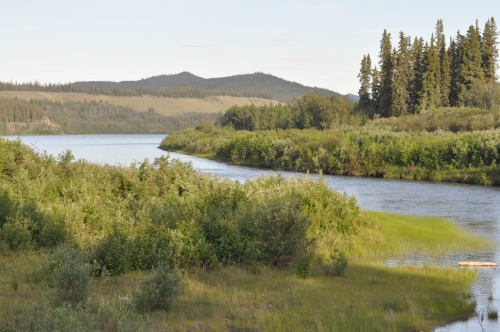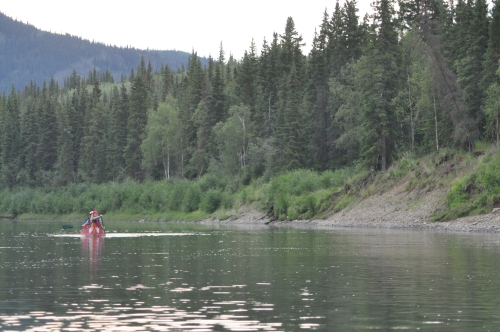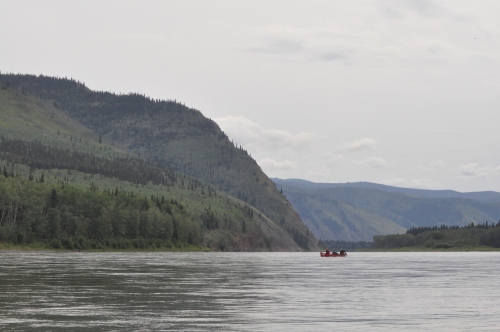
















































Yukon tour companies offer guided camping trips. You bring clothing and other small things but they handle the food, tents, canoes and mapping. Most clients for guided tours are from Germany. Companies even offer bilingual and German-language tours.
I recently took such a trip — amazingly after my wife won a random draw at the Yukon Visitors’ Centre last year and gave me the winning one-seat ticket with Ruby Range Adventures.
We were a group of 8 people with most from Germany. This included our guide who is now a Canadian citizen but immigrated here to pursue his dream of living in wild spaces.
Martin, the guide handled all the cooking. He directed the camp with endless patience despite working 14-hour days.
He also kept a can of bear spray clipped on his belt all the time.
The Big Salmon River is accessible by road through the Canol road (an old dirt road left over from WW2) which branches off the Alaska Highway.
For this trip you set off on canoes through Quiet Lake, Sandy Lake and Big Salmon Lake before reaching the river itself: From then it’s many days of paddling through a winding and narrow river with strong current. This year the water levels were low, and often there were often a few inches of water above the river stones.
The Big Salmon isn’t busy. Canoeing takes a commitment because the current is too strong to easily go back. Therefore once you enter you commit to at least a week of paddling to reach the larger Yukon River and go towards Carmacks.
The river is designated as Crown Land and completely pristine. People have made small campspaces (ie: flat ground) but these are not marked other than appearing on maps.
The river is out of cell-phone range. If something goes wrong it is possible to get Medevaced out but this requires a satellite phone to call for help. This happened on our trip. One person, who was nearly 70, experienced an infection in a wound. After several days of worsening, a satellite call reached EMTs who arrived in a helicopter within an hour. (I don’t know whether insurance will cover associated costs as the person was foreign.)
In 12 days our group saw only two other teams, brief encounters and waving from a distance.
The trip as a whole was about 300km.
We saw a black bear, countless bald eagles also saw Chinook salmon swimming upriver, returning all the way back from the Bering Sea to lay eggs.
One thing learned on this trip: Food keeps up morale. We had four canoes loaded with barrels, coolers, propane tanks for a BBQ, even things like jams and sauces in glass jars. We ate porridge, french toast, endless coffee, chili, ribs, spaghetti, burritos and plenty of sandwiches with sausage and cheese and chocolate for dessert. It was an entire pantry and kitchen to set up daily but this level of eating made it sustainable to stay outside all the time. People arrived after 12 days still happy and strong. Thankfully there were no portages with all these hundreds of pounds of gear and supplies.
Everyone had a good time despite a few days of rain and some cold nights, which at one point included frost on the tents in the morning. I was thankful to have brought a rubber hot-water bottle which provided needed heat in my sleeping bag.
The Germans were especially delighted to see a black bear and the trip was even capped with faint northern lights.















































































































